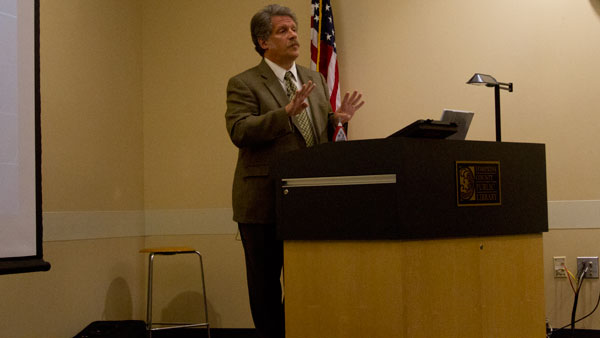After a meeting on Oct. 17 where Ithaca residents gathered to express their concerns about noise pollution, Eric Zwerling, president of the Noise Consultancy, a company that consults for municipalities with noise policies, is helping the City of Ithaca update its noise ordinance.
Ithaca’s current noise ordinance says a disruption is worthy of a ticket if it can be heard from 25 feet and is unreasonable. However, this raises the question of what the city defines as unreasonable. The vagueness of the current noise ordinance is exactly what several of the citizens at the meeting complained about.
Zwerling will be offering his expertise to help the city create a new noise ordinance that will satisfy the concerns of the community. After giving a presentation about noise and the various approaches to regulating it, the discussion was opened up, and Zwerling took notes about citizens’ complaints so that he could properly look into Ithaca’s specific noise issues.
While local businesses and college students were the most frequent focus of complaints, citizens also cited construction, truck traffic, barking dogs, Cornell’s stadium activities and the air system at McGraw House, a senior living community, as sources of unwanted noise. Fay Gougakis, an Ithaca resident who lives on The Commons, said her pleas for noise regulation have so far gone unheard.
“I am disgusted, disgusted beyond belief,” she said. “I have been complaining about these noise issues for so long, and I feel no one cares. The bar music is the worst offenders … my sleep’s disrupted. If you live on The Commons, you have the bar music [and] you have the students yelling to the top of their lungs at two o’clock in the morning.”
Ithaca resident Simon Wheeler said he would like an ordinance to be made that lowers the noise pollution caused by local businesses, but still allows for local economy to thrive.
“I don’t feel that commercial establishments should be able to noise pollute the neighborhood for their pure commercial gain on a regular basis,” Wheeler said. “I moved into the neighborhood to have the nearby commercial establishments … I [just] wish I didn’t hear the music.”
Many residents share Wheeler’s feelings about not wanting to hurt businesses through increased noise regulation. Jamie Williamson, public information officer of the Ithaca Police Department, said most noise complaints are made against residents instead of businesses.
“I think, in today’s day and age, people accept noise generated by commercial or industrial businesses,” Williamson said. “They’re more tolerant of it, whether it be a general noise complaint, loud music or loud people.”
Local Avi Smith said there should be a limit on the volume of individual voices. He said students yelling and cursing late at night as they walk back up the hills disrupts the peace of his area.
Zwerling said putting restrictions on individual voices is difficult because it can encroach on one’s First Amendment right to freedom of speech.
Zwerling also said he has experience with creating noise regulations in areas with a high concentration of college students.
“Whether this will result in enforcement actions against students singularly or in the aggregate, I don’t know,” he said. “But what I do hope happens — and that may be wishful thinking — is that the students, or the population in general, are more sensitized to the issue of noise,” he said.
Williamson said noise complaints are not limited to parts of the city with higher student populations, and violations are evenly distributed throughout the city.
“In the evening and night time, we receive complaints on East and South Hills, but all throughout the day, generally speaking … it’s downtown in The Commons district,” Williamson said.
Seph Murtagh, second ward on Ithaca’s Common Council, said he feels optimistic about the Oct. 17 meeting and the future ordinance.
“I would love if we could get it up and running by next summer,” he said. “I think that tonight’s meeting was the first step in what I hope will be a successful effort.”








